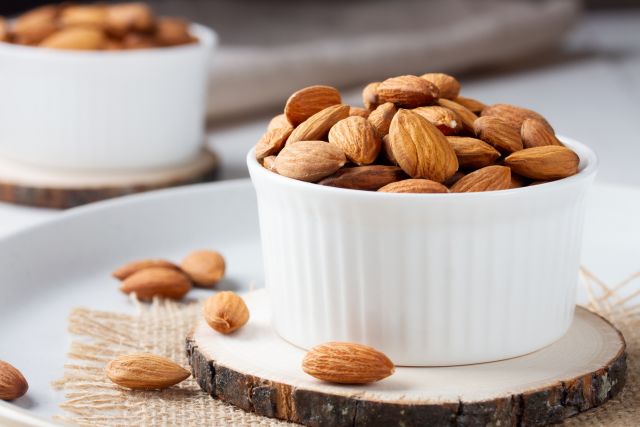Updated on July 17, 2024.
In the United States, roughly 86 million adults age 20 or older have cholesterol that’s higher than the recommended levels. And having high cholesterol is bad news for your heart health.
If you have high cholesterol, it’s important to consult with a healthcare provider (HCP) about ways to lower your levels. For starters, that may mean making adjustments to your daily habits, such as by getting more exercise and eating a heart-healthy, high-fiber diet rich in fresh fruits and vegetables, lean proteins, and healthy fats. It may also involve taking medications to help lower your cholesterol levels even more.
One food that you may want to include in your healthy eating plan is the almond. It combines fiber, protein, and healthy fats and may offer health perks for your heart. Here’s what to know about how this healthy nut helps your heart—plus, the best ways to incorporate almonds into your daily diet.
Almonds are packed with nutrients
Nutritionally speaking, almonds have a great profile. They’re rich in protein, dietary fiber, magnesium, potassium, vitamin E, and multiple types of healthy unsaturated fatty acids. Each of these ingredients helps support cardiovascular health. They also contain certain types of phytonutrients, healthful plant chemicals that can aid the growth of helpful gut microbes.
A 2018 review published in Nutrients looked carefully at several studies from around the world that examined nut consumption and its effects on heart health. The authors found that almonds in particular helped lower cardiovascular health risks. Specifically, they can help lower high cholesterol.
How cholesterol works
High cholesterol, also known as hyperlipidemia and dyslipidemia, is a health condition in which there are too many lipids (fats) in your bloodstream. This excess of fats can make it harder for your blood to flow because it can block arteries.
Cholesterol is partly a lipid and partly a protein. There are two main types of cholesterol, high-density lipoprotein (HDL) and low-density lipoprotein (LDL). HDL is considered “good” because it helps deliver cholesterol to your liver, the organ in your body that’s capable of processing it.
LDL, meanwhile, is considered “bad” because it can cause hardened plaques that clog up your arteries. Sometimes these plaques can get inflamed, too, which can cause blood clots. Both plaques and blood clots are very dangerous and can cause major health emergencies.
How almonds can help
Almonds can not only lower total cholesterol levels, but also LDL cholesterol. Some research cited in a 2024 review published in Nutrients also suggests that almonds may help improve the ability of HDL to effectively move cholesterol through the body. Almonds also have anti-inflammatory effects, so they can help prevent inflammation in arteries or in existing arterial plaques.
The 2018 review in Nutrients found that various studies over several decades have looked at the effects of adding different amounts of almonds to peoples’ daily diets. The addition of 100 grams, 45 grams, and even just 30 grams of almonds (or just about one ounce) each day have all been shown to significantly help reduce both LDL and total cholesterol levels when eaten consistently over weeks or months.
The mechanism isn’t entirely understood, but researchers think that plant sterols (a type of phytonutrient) in almonds play a role in helping to block the absorption of cholesterol. The large amount of unsaturated fat can help with your balance of lipids.
The best ways to get almonds into your diet
When adding almonds to your diet, the key is to make sure almonds aren’t just added on top of foods you already eat. In other words, as powerful as almonds are, they are not strong enough to erase the effects of an otherwise unhealthy diet. So seek to have your almonds replace less healthy foods, like refined carbohydrates and saturated fats, both of which can contribute to the development of heart disease.
A single serving of almonds is about one ounce (23 almonds or ¼ cup). That single ounce packs 165 calories and 6 grams of protein, along with 14 grams of healthy fat, 6 grams of carbohydrates, and 3 grams of fiber.
Roasted almonds and almond butter have been shown to be easier for the body to process and to absorb the healthful lipids they contain. Researchers suspect that the flavonoids and phenols in the skins of almonds play a beneficial role, too. So if you buy whole almonds, be sure to buy them with the skins on. Then, if you’d like to get the full benefit, simply home-roast them in the oven.
Almond oils have also shown in studies to be beneficial for cholesterol levels. (Because almond oil is a relatively delicate oil, it’s best used for room-temperature uses like salad dressing, rather than for cooking.)
Remember: No single food will be enough to take care of all your health and dietary needs. Aim for a balanced diet that includes fruits, vegetables, whole grains, low-fat dairy products, and lean proteins like beans, seafood, and poultry. And if there’s just something about almonds you don’t enjoy but you’d still like to reap similar the benefits, you can try other nuts that have similar nutrient profiles, such as cashews and walnuts.
(Of course, if you have a history of allergies to tree nuts such as almonds, it’s important to avoid eating them or consult with an HCP before doing so. The heart benefits of almonds and other tree nuts would not outweigh the potential dangers posed by food allergies.)
Limit your intake of salt, added sugars, saturated fats, and trans fats, and limit your overall calories to meet your needs. Make sure to incorporate regular exercise as well. With the help of all these factors, you’ll be doing your heart—and your whole body—a favor.







